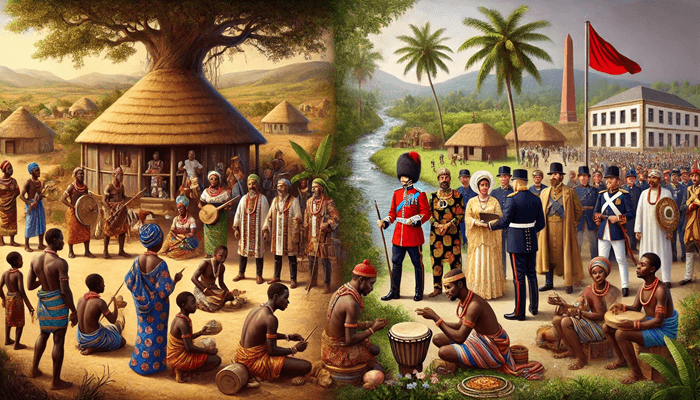Colonialism fundamentally changed the cultural, political and social structures of the Igbo people of southeastern Nigeria. Igbo culture is a diverse group of a people that occupied the southern parts of present-day Nigeria before the arrival of European colonizers and they had a decentralized political system and strong cultural and social traditions. Colonial rule, though, brought drastic changes that still affect the Igbo way of life.
Pre-Colonial Igbo Society
The Igbo people had a very decentralized system of governance. Unlike most other ethnic groups in Nigeria, the Igbo had no centralized kings or monarchs. Their political organization, in contrast, was structured around small, semi-independent communities ruled by councils of elders, age divisions and powerful families. This system placed a premium on peer decision-making and consensus, which meant that power was broadly distributed.
Igbo had a rich culture reflected in their festivals, music, dance, and oral literature. These cultural orientations were anchored on their traditional religious belief systems which revolved around the worship of ancestors, deities and the supreme god, Chukwu. The Igbo had great respect for families and community in social life, and extended family units became key to the process of passing down of values and norms.
Colonial Interference
Colonialism, first imposed by the British in the late 1800s, broke this indigenous fiber. It was difficult to use indirect rule amongst the Igbo as they did not have a central leader. The British thus established warrant chiefs, an extraneous and foreign system to Igbo traditions. These warrant chiefs tended to be wholly unqualified to the job or unpopular and sparked widespread resistance — some of which, such as the Aba Women’s Riot of 1929, made the colonial leaders fear for their lives.
Economic impact of colonialization: the Igbo economy transitioned from subsistence agriculture and local trade to cash crop production, especially palm oil, for export. This shift destabilized local economic goods and services and forced the Igbo economy into dependence on European outlets.
Cultural Changes
The Igbo culture was also significantly impacted by colonial education and Christian missionary activities. In the earlier years, missionary schools brought Western education concepts which resulted to the formation of a new elite of educated people known as the educated Igbo. This education opened avenues for social mobility, yes—but it decimated traditional forms of belief. Native religious practices fell into decline and cultural special occasions and rituals were relegated to the margins, as Christianity managed by missionaries took root.
During this age, traditional governance was also undermined by the adoption of Western-style legal systems. Customary laws and practices that had historically mediated conflicts and upheld social order began to be supplanted by colonial courts. This threatened the power of elders and traditional leaders.
Social Structures
Through the introduction of class divisions based on education and wealth, colonialism altered Igbo social structures. An educated elite arose that gapped traditional leaders and the new class of professionals. In addition, colonial policies marginalized women who played prominent socioeconomic and political roles in Igbo societies in pre-colonial times and, thus, gender roles were changed.
Women’s power in trade and governance, for instance, was eroded under colonial rule. Institutions such as the Umuada (a council of daughters) and women’s age grades, which were vital in regulating society, experienced less value. This marginalization of women’s voices is what led to the loss of gender balance in decision making.
Resistance and Adaptation
In the face of such disruptions, however, the Igbo resisted and adapted to colonial rule in diverse ways. The Aba Women’s Riot was a radical act of defiance that highlighted the strength of Igbo women in the face of colonial subjugation. Also, the Igbo adopted Western education as a means of advancement, using it to interact with and eventually confront colonial authorities.
In the years after Nigeria gained independence, the Igbo’s early emphasis on education and trade made them some of the country’s key players. Yet the legacy of colonialism — political instability, cultural erosion and economic dependency — still shapes the Igbo people today.
Colonialism had a major influence on the Igbo, changing their rule, lifestyle, and society. Colonial rule may have opened new avenues through education and integration into the world economy, but it also undermined traditional systems and created inequalities. Recognising this history is key to understanding the resilience of the Igbo people and their role in Nigeria’s socio-political history.
